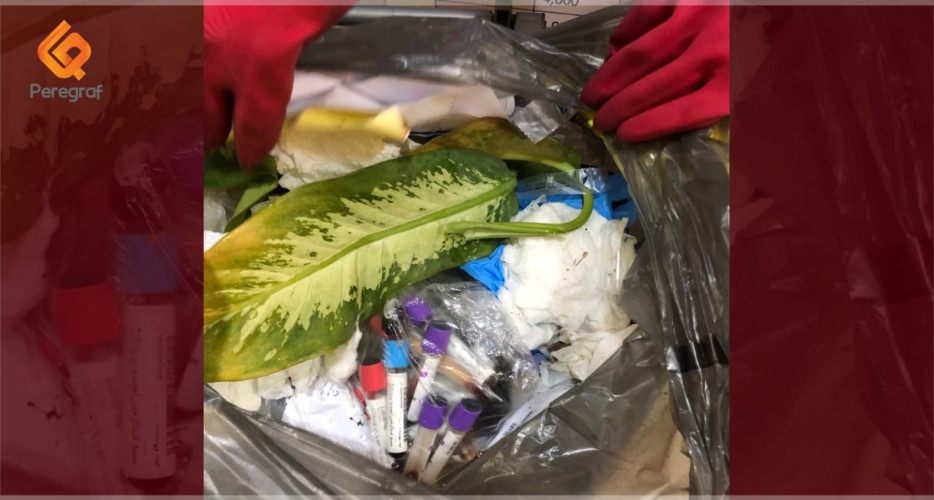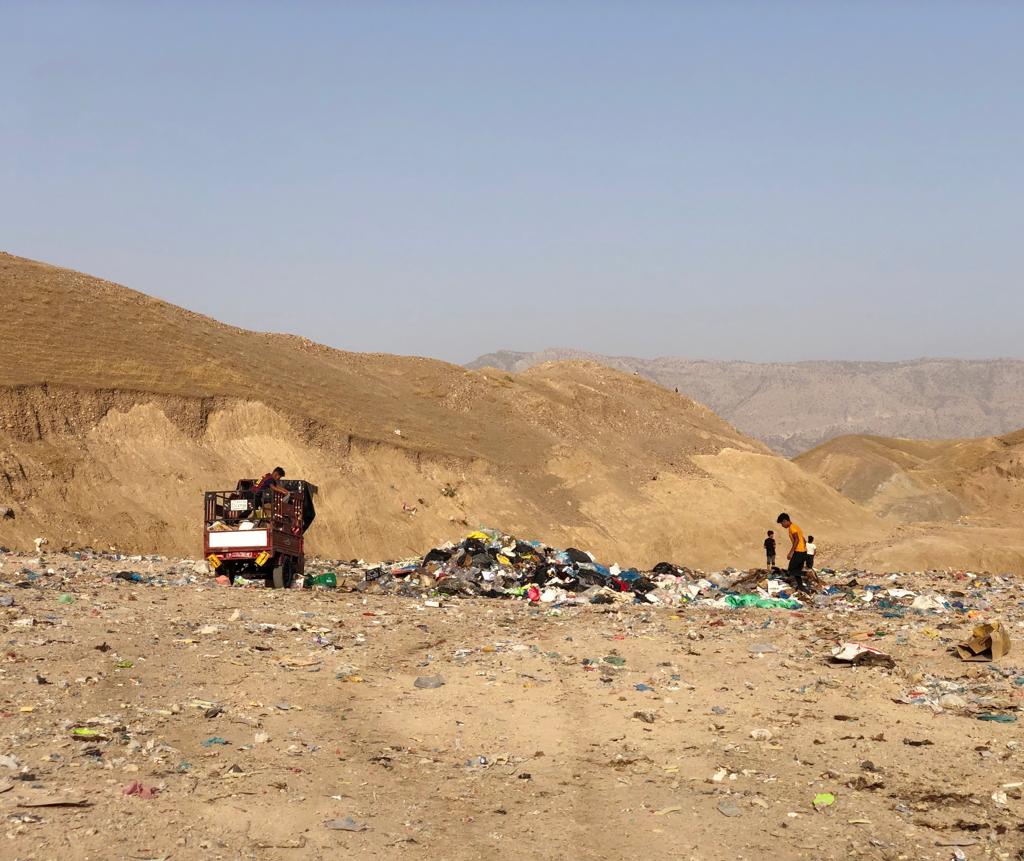
Peregraf- Ghamgin Muhammad
Nearly 60 tons of medical waste –some of which very dangerous– are taken monthly from Sulaymaniyah’s hospitals and medical centers and thrown into the Tanjaro area. Half of the waste is incinerated in medical waste incinerators and the other half is buried, leading to environmental pollution and many diseases, including cancer.
According to Peregraf’s investigations, aside from the 30 tons of medical waste which is not disposed of by the ministry of health, in some of Sulaymaniyah’s medical laboratories medical waste is mixed with normal waste without any medical supervision.
"We are aware of the risks of burying medical waste, but due to the lack of enough medical waste incinerators and the dysfunctionality of existing ones, we have no other option but to bury some of the waste." Head of Infection Control at Sulaimani General Directorate of Health Engineer Mohammed Mahwi, told Peregraf.
All medical waste collected from public and private hospitals and medical centers in Sulaimani is taken to Tanjaro, where half of the waste is placed in the medical waste treatment project. The medical waste treatment project has six incinerators, but now only Four of their incinerators are operating and two have been out of function for more than two years.
According to Mahwi, they are unable to put all six incinerators to work due to a lack of enough fuel and unstable electricity.
The 30 tons of waste need many years to decompose after being buried and contain toxic substances that mix with underground water when it rains.
According to World Health Organization, 15 percent of the world’s medical waste is toxic and capable of spreading many diseases. 16 billion needles are disposed of yearly around the world, some of which are not disposed of in professional ways and open doors to spreading many viruses transmitted through blood, such as liver virus.
Karwan Ali, an 11-year-old boy, has been collecting plastic and cans with his father from a garbage dump in Tanjaro for two years. Karwan has been suffering from skin thrush for five months and is currently undergoing treatment.
"No one in the family has the disease and the doctors say he got infected through transmission. Perhaps through his work with me at the waste site, although I warned him to not come with me. He refused to listen to me and did not wear gloves while collecting the waste." Karwan’s father Ali Mustafa told Peregraf.
Each hospital bed (i.e each patient) produces almost half a kilogram of medical waste, according to World Health Organization. This is especially worrisome in developing countries that lack safe methods under professional supervision to dispose of medical waste.
Karwan’s father, whose daily income depends on collecting waste at Tanjaro, has seen "various kinds of medical waste" at the site. Since his son’s infection, he is more protective while working and does not approach medical waste.
According to Peregraf’s investigations, away from the supervision of health care teams, some medical clinics and laboratories in Ibrahim Pasha Street, Tui Malik, and other small laboratories in Sulaimani, put medical waste in ordinary plastic bags and throw it among other household garbage.

Tanjaro site is a garbage dump in Sulaimaniyah. photo; Peregraf
Among the remains; there are medicines, chemical solutions, plasters, syringes, cloths, knives, glasses, laboratory materials, x-rays, amputations, skin, blood, hair, bones, and postoperative tools.
"We mix the medical waste from the laboratory where I work with ordinary household garbage and municipal workers take it to Tanjaro in ordinary vehicles." A biologist who asked to remain anonymous because of the sensitivity of the subject told Peregraf.
He also mentioned that he is against this act and would also prefer to separate the water sewage of medical laboratories from normal household water sewage because the sewage then mixes with the rivers and causes health damage.
This violation of rules and regulations is happening despite the regular visits of specialized medical teams that are responsible for emphasizing the implementation of guidelines and procedures by the medical laboratories.
The biologist told Peregraf that the laboratory in which he works has been visited several times by the committees and medical teams, but they have only asked for laboratory certificates and follow-up on expired materials. None of the teams have followed up on the procedures for the disposal of medical waste.
According to instruction No. 4 of 2021 of Environmental Protection from Pollution and Waste Disposal; The penalty for mixing medical waste with ordinary waste and failure to comply with the instructions, is initially a warning and a fine of 150,000 to 10 million dinars if continued, the final penalty of continued violation of rules and regulations is license withdrawal and closing the laboratory.
"There are medical clinics that produce the same size of medical waste as a health center, none of which is collected the correct way, the waste is put in plastic bags and mixed with ordinary waste before they are taken to Tanjaro, which is the worst form of medical waste disposal." The Head of Infection Control at Sulaimani’s Directorate of Health told Peregraf.
This is happening despite the presence of specialized yellow bags and baskets in most public and private medical treatment facilities that have been installed to collect medical waste in order to prevent it from being mixed with ordinary waste.
Private hospitals and medical centers are required to dispose of their waste through the government, which is charged 2,000 dinars for each kilogram of waste. Some of the hospitals and medical centers fraudulently put some of their medical waste among other ordinary household waste to not pay the required fee.
Engineer Mohammed Mahwi says, "It is true that sometimes the hospitals and medical centers violate the rules and regulations, which is why our teams compare the ratio of statistics of operations and the number of patients to the amount of waste given to specialized government vehicles. And sometimes we are informed by the municipality of Sulaimani if a medical center violates the rules and regulations in dealing with medical waste.
The medical waste treatment project in Tanjaro area of Sulaimani is close to residential areas, industrial areas, and several factories and warehouses, causing the spread of bad smells when operating.
"When the waste burners are working, they emit a horrible smell, especially when there is air movement. It is almost unbearable." Kamran Mohammed, owner of a factory in Tanjaro, told Paragraf.
Burning medical waste releases dioxins and furans, two carcinogens that poison the air, according to warnings from both the World Health Organization and the United Nations Environment Program.
"The incineration of medical waste produces dioxins, which contain about 75 chemicals that have a highly negative impact on human health." Sarwar Karadaghi, president of the Kurdistan Nature Organization, told Paragraf.
He believes that dumping medical waste in the environment is a serious crime because it has a negative impact on the pollution of environmental species in the air and soil.
Environmental pollution is a crime and its punishment is imprisonment and a fine of up to 200 million dinars according to law number 8 of 2008.
Razaq Khaylani, the spokesman of the Kurdistan Regional Environment Board, is not aware that some of the medical waste is buried underground in Sulaimani and mixed with normal garbage, while the other part is destroyed by burning.
"As far as we are aware through the Ministry of Health in the cities of the Kurdistan Region, there are steam cleaning types of equipment to destroy medical waste and not in the form of incineration," Khaylani told Paragraf.
There are two steam cleaning machines in Shahid Aso and Teaching Hospitals in Sulaimani, which work scientifically and have no smoke, they first disinfect medical waste and then grind it into ordinary waste with no harm, but the two machines have been out of function for more than two years. According to health officials, efforts are being made to repair them.
Khaylani promised to follow up on the disposal of medical waste in Sulaimani in the future through the Environmental Office.
The method of disposing of medical waste is not only unscientific in Sulaimani. According to Peregraf, Erbil and Duhok are also facing the same issue.
"There is no health protection or environmental protection here. What is happening is the killing of people and the damaging of the environment on purpose, all the while people are silent and ignore the disastrous future that harming the environment will bring" said the President of Kurdistan Nature Organization.